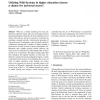Free Online Productivity Tools
i2Speak
i2Symbol
i2OCR
iTex2Img
iWeb2Print
iWeb2Shot
i2Type
iPdf2Split
iPdf2Merge
i2Bopomofo
i2Arabic
i2Style
i2Image
i2PDF
iLatex2Rtf
Sci2ools
UAIS
2008
2008
Utilizing Wiki-Systems in higher education classes: a chance for universal access?
Abstract Wikis are a website technology for mass collaborative authoring. Today, wikis are increasingly used for educational purposes. Basically, the most important asset of wikis is free and easy access for end users: everybody can contribute, comment and edit--following the principles of Universal access. Consequently, wikis are ideally suited for collaborative learning and a number of studies reported a great success of wikis in terms of active participation, collaboration, and a rapidly growing content. However, the wikis success in education was often linked either to direct incentives or even pressure. This paper strongly argues that this contradicts the original intentions of wikis and, furthermore, weakens the psycho-pedagogical impact. A study is presented which focuses on investigating the success of wikis in higher education, when students are neither enforced to contribute nor directly rewarded similar to the principles of Wikipedia. Amazingly, the results show that, in tot...
Abstract Wikis | UAIS 2008 | Wiki | Wikis Success |
| Added | 16 Dec 2010 |
| Updated | 16 Dec 2010 |
| Type | Journal |
| Year | 2008 |
| Where | UAIS |
| Authors | Martin Ebner, Michael D. Kickmeier-Rust, Andreas Holzinger |
Comments (0)

